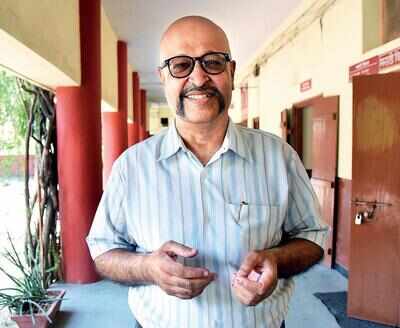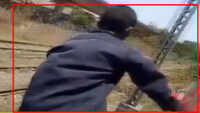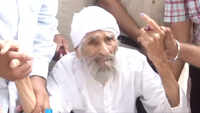
Nagpur: May 1 was a historic moment for the city. More than 6,000 Nagpurians gathered at Telangkhedi Lake to protest against the development plan of the lake as well as the road through a mini forest in Bharat Nagar, now named Bharat Van. It was non-political, offered no entertainment and had complete strangers joining hands for a cause. The calls went out through the social media and word of mouth. The gathering had saving the environment uppermost in the mind.
What is the significance of this protest? Will it serve any purpose? What if the road comes up anyway? To put this in perspective TOI spoke to Supantha Bhattacharya, associate professor & director of PG English at Hislop College. “Let us hope and pray that the saner elements in the bureaucracy and government recognize the campaign for what it really is — an apolitical, bona fide civil society movement to ensure that Nagpur still remains one of the greenest cities of the country,” he says in this interview which doesn’t mince any words.
Excerpts from the interview...
Q. The over-whelming response that the human chain (May 1) received was something that the city had never seen before. What’s your take on this public movement?
A. Over the years, thanks to the media, citizens have become increasingly aware of their environmental rights. They have also learnt to define a city as something beyond a merely utilitarian iron and concrete monstrosity. A clean, green urban space is now something we wish to bequeath to our progeny as a precious, sustainable legacy. The spontaneous ‘Save Bharat Van’ campaign appealed to the core values of decency, humanity and self-perpetuation within all of us.
Q. While we are turning cynical as a society, in what way do campaigns like ‘Bharat Van’ bring about a change? Does it mean that people are still willing to give their time, effort and, if need be, money too, if they feel that the cause is right?
A. Definitely. The only problem is the infiltration of politics into almost every aspect of our existence. It has made us instinctively suspicious of even genuine motives. We have seen a number of such effusive people’s movements in metros, although it may be a first for Nagpur.
Q. In such campaigns, to motivate people, is it important to have leadership that’s sincere?
A. The integrity of those who conceive, strategize and steer such campaigns must be above suspicion. Otherwise, their dishonesty would undermine the movement itself and discredit it. Often, vested interests infiltrate such agitations and exploit them for their own gains.
Q. Will this public movement reflect in the voting patterns?
A. I have my doubts. None of the major political parties in India put environmental concerns very high up in their manifestos. A diehard supporter of a party will rarely let his social conscience get in the way of his political preference. In India, most of us vote for either personalities or rhetoric, not for ideologies or issues.
Q. Is this the start of something big in the city?
A. I too have a dream that Nagpurians would have finally shrugged off their small-town, ghettoized mindset and begun to approach reality from a long-term, global perspective. That this is not merely a fashionable ‘trend’ to be tweeted about but an impassioned effort to save a tiny part of our only home — the planet Earth.
Q. Till now, politicians have been basically builders, defining development in terms of infrastructure. Do you think this definition will now change and environment will be a part of it?
A. Concrete roads, flyovers, metros rail etc create good electoral optics. ‘See we have done so much for your city; vote for us, or else these projects shall disappear!’ The ease with which massive deforestation is permitted for dubious projects by the environment ministry does not leave much scope for optimism. Maybe in the not-so-distant future, special environment zones have to be created to ensure sufficient oxygen supply to our dystopias. Tagore had accused God in one of his later poems: Those who have poisoned your air, those who have extinguished your light, Can it be that you have forgiven them? Can it be that you love them?
Q. Even after all this if the road gets constructed, will the efforts be a complete waste?
A. I was so impressed by the thousands of enthusiastic children who were part of the human chain at Futala on May 2. As long as there are children, there is hope. The ‘Matsya Purana’ says: dasha-kūpa-samā vāpī, dasha-vāpī-samo hradaḥ/dasha-hrada-samaḥ putro, dasha-putra-samo drumaḥ (A pond equals ten wells, a reservoir equals ten ponds/A son equals ten reservoirs, and a tree equals ten sons!) We, the people, must remember this campaign as one which demonstrated the immense power of mass mobilization. The time has come when collective will — rather than self-serving goals — determine public policy.
Q. Does the city lack awareness in social matters? Why isn't it able to produce leaders who are not communists, termed urban Naxals or antigovernment but purely cause-driven?
A. The Save Bharat Van protest has amply proved the fallacy behind the first question. I do not agree with the opinion that a communist cannot prove to be a competent, sensitive leader. And the term ‘urban Naxal’ is merely a convenient label used to conceal governance failure. Historically, Vidarbha leaders, across party lines, have been subservient to their Western Maharashtra counterparts, supporting causes only if they further their own aspirational agendas. Unless educated, socio-culturally oriented youngsters join mainstream politics in large numbers, we would continue to suffocate within a leadership vacuum.
Q. Do you think authorities will recognize this public campaign? Or do they only pay heed to only violent protests?
A. Conflict and violence in any form: Terrorism, counter-terrorism, state-sponsored repression, only replicates itself and is never a solution.
Q. How can the Bharat Van agitation be taken forward democratically? Should the protesters just lie down in front of bulldozers when the mini forest would be destroyed?
A. We can only hope things won’t come to such a drastic pass and the woods would be left intact. I have tremendous regard for all the organizers and the participants of this campaign who have not taken a single illegitimate or uncivilised step. If necessary, we must be prepared to take this protest to the highest authorities of the land. Miles to go before we sleep.
What is the significance of this protest? Will it serve any purpose? What if the road comes up anyway? To put this in perspective TOI spoke to Supantha Bhattacharya, associate professor & director of PG English at Hislop College. “Let us hope and pray that the saner elements in the bureaucracy and government recognize the campaign for what it really is — an apolitical, bona fide civil society movement to ensure that Nagpur still remains one of the greenest cities of the country,” he says in this interview which doesn’t mince any words.
Excerpts from the interview...
Q. The over-whelming response that the human chain (May 1) received was something that the city had never seen before. What’s your take on this public movement?
A. Over the years, thanks to the media, citizens have become increasingly aware of their environmental rights. They have also learnt to define a city as something beyond a merely utilitarian iron and concrete monstrosity. A clean, green urban space is now something we wish to bequeath to our progeny as a precious, sustainable legacy. The spontaneous ‘Save Bharat Van’ campaign appealed to the core values of decency, humanity and self-perpetuation within all of us.
Q. While we are turning cynical as a society, in what way do campaigns like ‘Bharat Van’ bring about a change? Does it mean that people are still willing to give their time, effort and, if need be, money too, if they feel that the cause is right?
A. Definitely. The only problem is the infiltration of politics into almost every aspect of our existence. It has made us instinctively suspicious of even genuine motives. We have seen a number of such effusive people’s movements in metros, although it may be a first for Nagpur.
Q. In such campaigns, to motivate people, is it important to have leadership that’s sincere?
A. The integrity of those who conceive, strategize and steer such campaigns must be above suspicion. Otherwise, their dishonesty would undermine the movement itself and discredit it. Often, vested interests infiltrate such agitations and exploit them for their own gains.
Q. Will this public movement reflect in the voting patterns?
A. I have my doubts. None of the major political parties in India put environmental concerns very high up in their manifestos. A diehard supporter of a party will rarely let his social conscience get in the way of his political preference. In India, most of us vote for either personalities or rhetoric, not for ideologies or issues.
Q. Is this the start of something big in the city?
A. I too have a dream that Nagpurians would have finally shrugged off their small-town, ghettoized mindset and begun to approach reality from a long-term, global perspective. That this is not merely a fashionable ‘trend’ to be tweeted about but an impassioned effort to save a tiny part of our only home — the planet Earth.
Q. Till now, politicians have been basically builders, defining development in terms of infrastructure. Do you think this definition will now change and environment will be a part of it?
A. Concrete roads, flyovers, metros rail etc create good electoral optics. ‘See we have done so much for your city; vote for us, or else these projects shall disappear!’ The ease with which massive deforestation is permitted for dubious projects by the environment ministry does not leave much scope for optimism. Maybe in the not-so-distant future, special environment zones have to be created to ensure sufficient oxygen supply to our dystopias. Tagore had accused God in one of his later poems: Those who have poisoned your air, those who have extinguished your light, Can it be that you have forgiven them? Can it be that you love them?
Q. Even after all this if the road gets constructed, will the efforts be a complete waste?
A. I was so impressed by the thousands of enthusiastic children who were part of the human chain at Futala on May 2. As long as there are children, there is hope. The ‘Matsya Purana’ says: dasha-kūpa-samā vāpī, dasha-vāpī-samo hradaḥ/dasha-hrada-samaḥ putro, dasha-putra-samo drumaḥ (A pond equals ten wells, a reservoir equals ten ponds/A son equals ten reservoirs, and a tree equals ten sons!) We, the people, must remember this campaign as one which demonstrated the immense power of mass mobilization. The time has come when collective will — rather than self-serving goals — determine public policy.
Q. Does the city lack awareness in social matters? Why isn't it able to produce leaders who are not communists, termed urban Naxals or antigovernment but purely cause-driven?
A. The Save Bharat Van protest has amply proved the fallacy behind the first question. I do not agree with the opinion that a communist cannot prove to be a competent, sensitive leader. And the term ‘urban Naxal’ is merely a convenient label used to conceal governance failure. Historically, Vidarbha leaders, across party lines, have been subservient to their Western Maharashtra counterparts, supporting causes only if they further their own aspirational agendas. Unless educated, socio-culturally oriented youngsters join mainstream politics in large numbers, we would continue to suffocate within a leadership vacuum.
Q. Do you think authorities will recognize this public campaign? Or do they only pay heed to only violent protests?
A. Conflict and violence in any form: Terrorism, counter-terrorism, state-sponsored repression, only replicates itself and is never a solution.
Q. How can the Bharat Van agitation be taken forward democratically? Should the protesters just lie down in front of bulldozers when the mini forest would be destroyed?
A. We can only hope things won’t come to such a drastic pass and the woods would be left intact. I have tremendous regard for all the organizers and the participants of this campaign who have not taken a single illegitimate or uncivilised step. If necessary, we must be prepared to take this protest to the highest authorities of the land. Miles to go before we sleep.
#ElectionsWithTimes
Quick Links
Lok Sabha Election Schedule 2019Lok Sabha Election NewsDelhi Capitals teamMI team 2019Rajasthan Royals 2019RCB team 2019Maharashtra Lok Sabha ConstituenciesBJP Candidate ListBJP List 2019 TamilnaduShiv Sena List 2019AP BJP List 2019Mamata BanerjeeBJP List 2019 MaharashtraPriyanka GandhiBJP List 2019 KarnatakaAMMK Candidate List 2019BJP List 2019 WBLok Sabha Elections in Tamil NaduBSP List 2019 UPNews in TamilLok Sabha Poll 2019Satta Matka 2018PM ModiMahagathbandhanNagpur BJP Candidate ListChandrababu NaiduTamil Nadu ElectionsUrmila MatondkarNews in TeluguMadras High CourtTejashwi YadavArvind KejriwalTejasvi SuryaPawan KalyanArvind KejriwalYogi AdityanathJaya PradaSatta King 2019Srinagar encounter
Get the app









